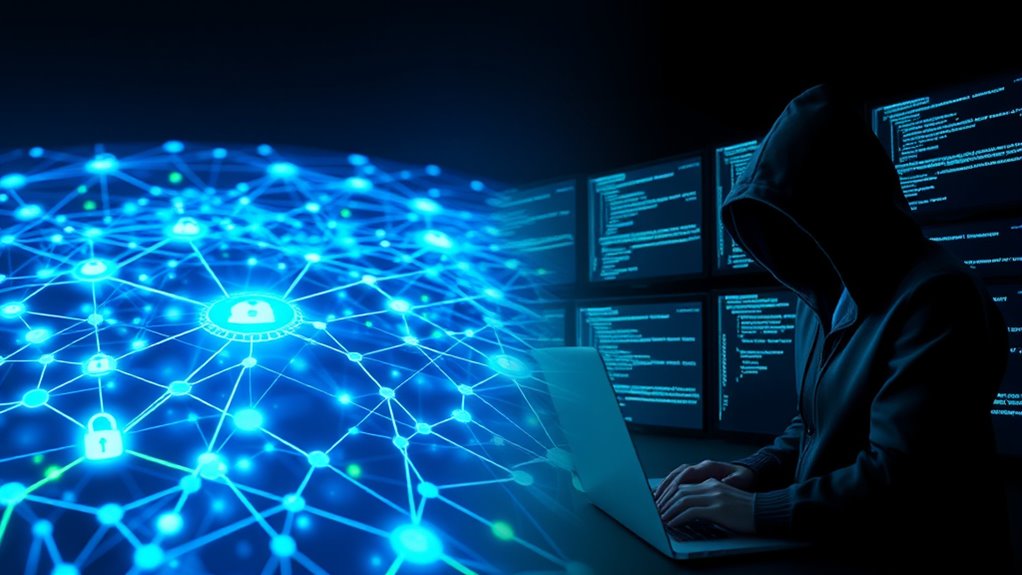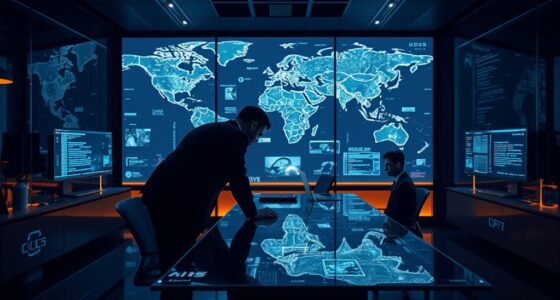Cybersecurity is about protecting systems, data, and networks from unauthorized access, attacks, and vulnerabilities through defense strategies like firewalls, encryption, and security audits. In contrast, cyber espionage involves covertly infiltrating these systems to steal sensitive information for strategic or financial gain. While cybersecurity aims to defend and secure, cyber espionage seeks to bypass those defenses for malicious purposes. Understanding these differences helps you grasp how digital threats operate—continue exploring to learn more.
Key Takeaways
- Cybersecurity involves authorized measures to protect systems, while cyber espionage is illicit and covert data theft.
- Ethical hacking is a proactive security practice, whereas cyber espionage aims to secretly gather intelligence.
- Cybersecurity creates a resilient environment through defenses like firewalls and encryption; espionage exploits vulnerabilities maliciously.
- Legal and ethical boundaries distinguish authorized security efforts from illegal espionage activities.
- Cybersecurity aims to prevent breaches and safeguard data; espionage seeks to steal secrets for strategic advantage.

Have you ever wondered how organizations protect themselves from digital threats while others exploit the same vulnerabilities for espionage? It’s a complex landscape where the line between defending and attacking digital assets often blurs. In the domain of cybersecurity, proactive measures like ethical hacking are indispensable. Ethical hacking involves authorized attempts to identify and fix security weaknesses before malicious actors can exploit them. This process plays a fundamental role in information assurance, which is all about maintaining the confidentiality, integrity, and availability of sensitive data. When organizations invest in ethical hacking, they’re essentially strengthening their defenses, making it harder for cybercriminals or state-sponsored hackers to penetrate their systems.
Cybersecurity is essentially about establishing a robust defense against cyber threats. It encompasses a broad range of strategies, technologies, and policies designed to protect digital infrastructure. This includes firewalls, encryption, intrusion detection systems, and regular security audits. The goal is to create a resilient environment where data remains safe from unauthorized access or tampering. Ethical hacking fits into this framework by simulating cyberattacks to uncover vulnerabilities before malicious actors do. It helps organizations understand their security gaps and fix them proactively, rather than waiting for a breach to occur. This proactive stance is fundamentally important in maintaining strong information assurance, ensuring that sensitive information stays confidential and unaltered. Recognizing the importance of penetration testing is essential for effective cybersecurity measures. Additionally, understanding how vulnerabilities are exploited is crucial for developing comprehensive defense strategies.
On the flip side, cyber espionage involves the covert use of digital tools to gather intelligence illicitly. State-sponsored entities or sophisticated hackers target corporate or government networks to steal trade secrets, military plans, or other confidential data. Unlike ethical hacking, which is authorized and conducted within legal boundaries, cyber espionage is malicious and often clandestine. The perpetrators exploit vulnerabilities just as cybersecurity professionals do, but their intent is to steal, not defend. This malicious activity can cause significant damage, including financial loss, compromised national security, and erosion of trust in digital systems. Cyber espionage often employs advanced techniques to evade detection and maintain long-term access to targeted networks. The clandestine nature of espionage makes it particularly difficult to detect and counteract effectively. A thorough understanding of digital vulnerabilities can help organizations better prepare for such threats.
Understanding the difference boils down to intent and legality. Ethical hacking aims to improve security, while cyber espionage seeks to undermine it for strategic advantage. Organizations that invest in strong cybersecurity practices, including ethical hacking and thorough information assurance, can better defend against these threats. They create a layered security approach that not only prevents attacks but also ensures rapid detection and response when breaches occur. Knowing how to distinguish between legitimate security efforts and malicious espionage helps you grasp the importance of continuous vigilance in the digital age. Ultimately, safeguarding digital assets requires a proactive mindset—one that combines ethical hacking with robust security policies to stay one step ahead of malicious actors.
Frequently Asked Questions
How Can Organizations Detect Cyber Espionage Activities Early?
You can detect cyber espionage early by implementing anomaly detection systems that monitor unusual activity on your network. Stay proactive by leveraging threat intelligence sources to identify emerging threats and indicators of compromise. Regularly analyze logs, watch for unexpected data transfers, and update security protocols. Combining anomaly detection with threat intelligence enables you to identify suspicious behaviors quickly, reducing the risk of espionage activities going unnoticed and helping you respond before significant damage occurs.
What Legal Actions Exist Against Cyber Espionage Perpetrators?
When it comes to fighting cyber espionage, the law is your sword and shield. You can pursue legal sanctions against perpetrators, including fines and imprisonment, to hold them accountable. Diplomatic measures also play a crucial role, helping to pressure nations or groups involved. These actions aim to deter future attacks and protect your organization’s sensitive information, making it clear that cyber espionage won’t go unpunished.
Are Nation-States the Primary Actors in Cyber Espionage?
You should know that nation-states are indeed the primary actors in cyber espionage. They often involve themselves in espionage tactics to gather intelligence, leverage cyber tools, and infiltrate other countries’ systems. Their involvement is significant because they have the resources and motivation to conduct extensive cyber operations. Understanding this helps you recognize the scale and sophistication behind many cyber espionage activities, which often surpass those of individual hackers or non-state actors.
How Does Cyber Espionage Impact National Security?
Imagine your national security as a fortress under siege; cyber espionage is the silent infiltrator slipping through unseen. It fuels industrial espionage and corporate spying, weakening your defenses from within. When enemies steal sensitive information, they gain strategic advantages, threaten economic stability, and compromise critical infrastructure. This covert warfare makes you vulnerable, erodes trust, and puts your nation’s safety at risk—highlighting how cyber espionage can shake your security to its core.
What Are the Best Practices to Prevent Cyber Espionage?
To prevent cyber espionage, you should prioritize strong cyber hygiene by regularly updating software, using complex passwords, and enabling multi-factor authentication. Be vigilant about insider threats by monitoring employee activity and restricting access to sensitive information. Educate your team on security best practices and recognize suspicious behavior. These proactive steps help safeguard your systems, reduce vulnerabilities, and guarantee your organization stays ahead of potential espionage attempts.
Conclusion
Think of cybersecurity as your shield in a digital battlefield, protecting your fortress from unseen invaders. Cyber espionage, on the other hand, is like a sneaky spy lurking in the shadows, trying to steal secrets without your knowledge. Staying vigilant is your sword and armor—only by understanding the difference can you defend your digital kingdom effectively. Remember, in this war of wits, knowledge is your greatest weapon. Stay alert, stay secure.









